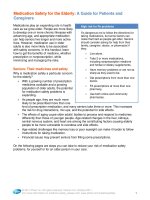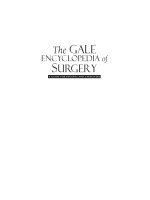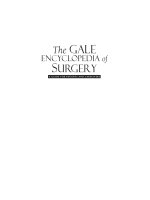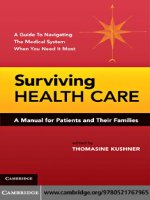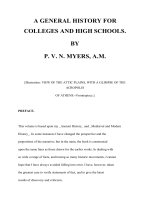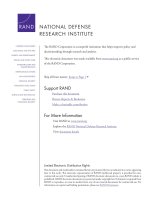Surviving Health Care A Manual for Patients and Their Families potx
Bạn đang xem bản rút gọn của tài liệu. Xem và tải ngay bản đầy đủ của tài liệu tại đây (1.44 MB, 339 trang )
This page intentionally left blank
Surviving Health Care
A Manual for Patients and Their Families
This book serves as a tool to help patients and their families deal
rationally with the perplexing and often irrational world of health
care. It covers the topics and addresses the challenges that experts in
a variety of health care fields believe are the most vital to meeting
the challenges of decision making when people feel most vulnera-
ble. With contributions from leading health care specialists, Surviving
Health Care: A Manual for Patients and Their Families examines a wide
array of topics, including advance planning for health care, medical
emergencies, genetic testing, pain management, and care of elders. It
is a unique resource that aims above all to help patients reach their
best health care decisions.
Thomasine Kushner is co-editor of the Cambr idge Quarterly of Health-
care Ethics and a bioethicist with the California Pacific Medical Center
Program in Medicine and Human Values in San Francisco. She taught
bioethics at the University of California, Berkeley, for fifteen years
and is the author (with David Thomasma) of Bir th to Death: Science
and Bioethics, Asking to Die: Inside the Dutch Debate about Euthanasia,
and Ward Ethics: A Case Book for Doctors-in-Training, along with several
books on aesthetics and design.
Surviving Health Care
A Manual for Patients and Their Families
Edited by
Thomasine Kushner
CAMBRIDGE UNIVERSITY PRESS
Cambridge, New York, Melbourne, Madrid, Cape Town, Singapore,
São Paulo, Delhi, Dubai, Tokyo
Cambridge University Press
The Edinburgh Building, Cambridge CB2 8RU, UK
First published in print format
ISBN-13 978-0-521-76796-5
ISBN-13 978-0-521-74441-6
ISBN-13 978-0-511-72959-1
© Cambridge University Press 2010
2010
Information on this title: www.cambridge.org/9780521767965
This publication is in copyright. Subject to statutory exception and to the
provision of relevant collective licensing agreements, no reproduction of any part
may take place without the written permission of Cambridge University Press.
Cambridge University Press has no responsibility for the persistence or accuracy
of urls for external or third-party internet websites referred to in this publication,
and does not guarantee that any content on such websites is, or will remain,
accurate or appropriate.
Published in the United States of America by Cambridge University Press, New York
www.cambridge.org
Pa
p
erback
eBook
(
NetLibrar
y)
Hardback
To William S. Andereck and Dena M. Bravata, physicians for all seasons
Contents
Contributors page ix
Preface xiii
1. Letter to Patients: On Becoming the “Good” Patient and
Finding the “Right” Doctor 1
Leonard C. Groopman
2. Becoming an Active Member of Your Health Care Team 13
William A. Norcross
3. Information That Will Help You with Advance Planning
for Your Health Care 26
Mark R. Wicclair
4. Responding to Medical Emergencies 46
Kenneth V. Iserson
5. What You Need to Know about Medical Errors 56
Erica S. Friedman and Rosamond Rhodes
6. Being Informed When You Give Consent to
Medical Care 69
Ben A. Rich
7. Beware of Scorecards 85
James J. Strain and Rosamond Rhodes
8. Transplantation 101: Negotiating the System 96
Aaron Spital and Steven Smith
vii
viii Contents
9. When the Illness Is Psychiatric 124
Leonard C. Groopman
10. On the Horizon: Genetic Testing 136
Robyn S. Shapiro
11. To Be or Not to Be – A Research Subject 146
Eric M. Meslin and Peter H. Schwartz
12. Information That Will Help You Make Health Care
Decisions for Adult Family Members 163
Mark R. Wicclair
13. Caring for Individuals with Alzheimer’s Disease: Ethical
Issues along the Way 179
Robyn S. Shapiro
14. When the Patient Is a Child 191
Timothy S. Yeh
15. Care of Elders 206
Claudia Landau and Guy Micco
16. Being and Thinking 222
Ilina Singh, Claudia Jacova, Paul Ford, and Judy Illes
17. A Patient’s Guide to Pain Management 246
Ben A. Rich
18. The Hardest Decisions: When Treatment Stops Working 264
Timothy E. Quill and Mindy Shah
19. What You Need to Know about Disasters 279
Griffin Trotter
20. Making the Internet Work for You: Researching Your
Health Questions 294
Bette Anton
Appendix: Patient Individual Profile 311
J. Westly McGaughey, Ruchika Mishra, and Alexis Lopez
Index 317
Contributors
Bette Anton, MLS
, is Head Librarian for the Pamela & Kenneth
Fong Optometry and Health Sciences Library of the University of
California, Berkeley. This library serves the University of California,
Berkeley School of Optometry, and the University of Califor-
nia, Berkeley–University of California, San Francisco, Joint Medical
Program.
Paul Ford, PhD
, is Associate Staff in Bioethics and Neurology at
the Cleveland Clinic Foundation and Assistant Professor, Cleveland
Clinic Lerner College of Medicine of Case Western Reserve Univer-
sity, Cleveland, Ohio. He is co-editor, with Denise M. Dudzinski, of
Complex Ethics Consultations: Cases That Haunt Us (Cambridge Uni-
versity Press, 2009).
Erica S. Friedman, MD
, is an internist and rheumatologist with
Mount Sinai School of Medicine in New York City, where she is also
Associate Dean for Undergraduate Medical Education.
Leonard C. Groopman, MD, PhD
, is Assistant Professor of Clini-
cal Psychiatry and Medical Ethics at Weill Cornell Medical College,
where he also is active in the Institute for the History of Psychiatry.
Judy Illes, PhD
, is Professor of Neurology and Canada Research
Chair in Neuroethics, National Core for Neuroethics, at the Univer-
sity of British Columbia. Her book, Neuroethics: Defining the Issues in
Theory, Practice and Policy, was published by Oxford University Press
in January 2006.
ix
x Contributors
Kenneth V. Iserson, MD, MBA, FACEP, FAAEM
, is Professor
Emeritus of Emergency Medicine, University of Arizona College
of Medicine, Tucson.
Claudia Jacova, PhD
, is a Postdoctoral Fellow in Neurobiology and
Behavior, University of British Columbia, Canada.
Claudia Landau, MD, PhD
, is Associate Clinical Professor of
Medicine and Coordinator of the Geriatric Curriculum in the Uni-
versity of California, Berkeley–Univer sity of California, San Francisco,
Joint Medical Program, Berkeley, and Chief of Geriatrics and Palliative
Care in the Department of Medicine at the Alameda County Health
Center, Oakland, California.
Alexis Lopez, BA
, is a Research Technician with the Program in
Medicine and Human Values, California Pacific Medical Center, San
Francisco, California.
J. Westley McGaughey, BA
, is Research Analyst, Grants and Study,
in the Program in Medicine and Human Values, California Pacific
Medical Center, San Francisco, California.
Eric M. Meslin, PhD
, is Director of the Indiana University Center
for Bioethics, Associate Dean for Bioethics, and Professor of Medicine
and of Medical and Molecular Genetics at Indiana University School
of Medicine. He also is Professor of Philosophy at the School of Liberal
Arts and Co-Director of the Indiana University–Purdue University,
Indianapolis, Signature Center Consortium on Health Policy, Law,
and Bioethics. He has more than eighty publications on topics ranging
from inter national health research to science policy, including Belmont
Revisited: Ethical Principles for Research with Human Subjects, co-edited
with James F. Childress and Harold T. Shapiro.
Guy Micco, MD
, is a Clinical Professor in the University of Califor-
nia, Berkeley–University of California, San Francisco, Joint Medical
Program; Director of the University of California, Berkeley, Academic
Geriatric Resource Center (Center on Aging); and Co-Director of the
University of California, Berkeley, Center for Medicine, the Human-
ities, and Law, Berkeley, Califor nia.
Ruchika Mishra, PhD
, is editor of the Ethics Committees at Work
section of the Cambridge Quarterly of Healthcare Ethics and a 2008–2009
Postdoctoral Fellow in the Program in Medicine and Human Values,
California Pacific Medical Center, San Francisco, California.
Contributors xi
William A. Norcross, MD
, specializes in family practice and geriatric
medicine in the Department of Family and Preventive Medicine at
the University of California, San Diego. He is the founder of the
Physician Assessment and Clinical Education (PACE) program.
Timothy E. Quill, MD
, is Professor of Medicine, Psychiatry, and Med-
ical Humanities and Director of the Center for Ethics, Humanities,
and Palliative Care at the University of Rochester School of Medicine.
He is the author of numerous books and articles on issues related to
palliative care and end-of-life concerns.
Rosamond Rhodes, PhD
, is Professor of Medical Education and
Director of Bioethics Education at Mount Sinai School of Medicine
and Associate Professor of Philosophy at the Graduate School, City
University of New York. She is co-editor of the American Philosoph-
ical Association Newsletter on Philosophy and Medicine and co-editor of
Medicine and Social Justice: Essays on the Distribution of Health Care
(Oxford Univer sity Press, 2002).
Ben A. Rich, JD, PhD
, is Professor and Chair of the Bioethics Pro-
gram, University of California, Davis, Sacramento, California. He is
the author of Strange Bedfellows: How Medical Jurisprudence Has Influ-
enced Medical Ethics and Medical Practice (Kluwer Academic/Plenum
Publishers, 2001).
Peter H. Schwartz, MD, PhD
, is a core faculty member of the Indi-
ana University Center for Bioethics, Assistant Professor of Medicine
at the Indiana University Medical Center, and Assistant Professor of
Philosophy at the Indiana University School of Liberal Arts at Indi-
anapolis. He also practices adult outpatient medicine at the Primary
Care Clinic at Wishard Hospital.
Mindy Shah, MD
, is an attending physician on the inpatient palliative
care consult service at the University of Rochester Medical Center,
Strong Memorial Hospital.
Robyn S. Shapiro, JD
, is editor of the Bioethics Education section
in Cambridge Quarterly of Healthcare Ethics and a health law partner with
Drinker Biddle & Reath LLP. She recently completed her twenty-six-
year-tenure as Professor of Bioethics and Director of the Center for
the Study of Bioethics at the Medical College of Wisconsin.
Ilina Singh, PhD
, is Wellcome Trust Lecturer in Bioethics and Society
at the London School of Economics, London, England.
xii Contributors
Steven Smith, MD
, is a transplant nephrologist and Associate Profes-
sor in the Division of Endocrinology, St. Luke’s Roosevelt Hospital,
New York.
Aaron Spital, MD
, is an academic nephrologist at Elmhurst Hospital
Center in Elmhurst, New York, and Clinical Professor of Medicine at
Mount Sinai School of Medicine. He has had a longtime interest in
ethical issues in organ transplantation and edits the Ethics section of
Seminars in Dialysis.
James J. Strain, MD
, is Professor in the Department of Psychiatry,
Mount Sinai Medical Center in New York City.
Griffin Trotter, MD, PhD
, is Associate Professor in the Center for
Health Care Ethics at Saint Louis University, where he also holds
an appointment in the Department of Surgery, Emergency Medical
Division. He is the author of The Loyal Physician (Vanderbilt University
Press, 1997) and The Ethics of Coercion in Mass Causality Medicine ( Johns
Hopkins University Press, 2007).
Mark R. Wicclair, PhD
, is Professor of Philosophy and Adjunct
Professor of Community Medicine, West Virginia University, and
Adjunct Professor of Medicine and a part-time instructor of bioethics
at the Center for Bioethics and Health Law Faculty, University of
Pittsburgh. He is author of Ethics and the Elderly (Oxford University
Press, 1993).
Timothy S. Yeh, MD
, is Director of the Division of Critical Care
Medicine and Vice Chairman of the Department of Pediatrics, Chil-
dren’s Hospital of New Jersey at Newark Beth Israel Medical Center.
As Administrative Director of Critical Care, he supervises the oper-
ation of the Pediatric Intensive Care Unit, and as Vice Chairman,
he assists in prog ram development and planning for the Department
of Pediatrics. He lectures extensively and is the author of numerous
abstracts, articles, and book chapters.
Preface
Alice’s lament after falling down the rabbit hole captures what most
of us feel when we are catapulted into t he world of illness: “How
queer everything is today! And yesterday things went on just as usual.
I wonder if I’ve been changed in the night?” Suddenly, like Alice,
you find yourself struggling in an alien environment, with an unfa-
miliar culture, where even the language is strange. How do you cope?
How do you manage? How do you find your way? Like Alice, it’s
natural to think, “It would be so nice if something made sense for a
change.”
Making sense of and surviving the powerlessness produced by illness
are what this book is about, and it had its beginning where all medical
encounters start – with the patient. In this case, HK, a vibrant man
in his fifties who had achieved every worldly success, in large part
because of the power of his personality and his ability to tackle difficult
problems and solve them in creative ways. When he began to notice
a persistent pain in his shoulder and arm, he attributed it to strain
from physical activity. However, it did not decrease, and when he met
a colleague for lunch, he complained of having trouble climbing the
steep steps outside the restaurant. Alarmed, his friend urged him to go
directly to an emergency department, where it was immediately clear
he was having a heart attack. That began what HK later described as a
descent into chaos in which he felt powerless, frightened, and totally at
the mercy of a system he did not understand. Several years after open
heart surgery, bouts in intensive care, and rehabilitation, HK urged
the writing of a guide for patients – present and future – to help them
xiii
xiv Preface
navigate the unfamiliar world of health care and survive on their own
terms and with their dignity intact.
There is a surfeit of self-help information on health: how to reach
and maintain maximum health through diet, exercise, lifestyle regi-
mens, and so forth. Such measures are all for the good, but what has
been missing – and critically needed – is what HK wanted, a survival
kit with tools to help patients and their families deal rationally with
the perplexing and often ir rational world of health care. Physicians
tell us they find the health care system frustrating and even befud-
dling; it takes no imagination to discern how those of us outside the
health care system feel! This manual is intended as a survival guide to
help you find your way and regain control in a seemingly uncontrol-
lable situation at a time when patients and families are at their most
vulnerable.
All of us are united by our common desire to find useful informa-
tion to meet inevitable health care challenges. However, it should be
noted that when it comes to individual health care, one size does not
fit all. Determining your own health care decisions must remain, as
it should, an essential part of your relationship with your physician.
Instead, what you will find here are practical suggestions to guide you
through the Terra Incognita created by illness. Rather than solutions,
the goal here is to afford you the kind of information and perspectives
a variety of health care experts believe are your best navigational tools
for reaching the best possible decisions for yourself and your family.
Because of the wide range of issues that need to be covered, as well
as the breadth of information required to address them, my task as
editor was to get contributors who are experts in the most challenging
issues patients have to face. This volume includes chapters written
by individuals not only from my own discipline (philosophy), but
also from medicine, bioethics, public policy, psychology, and the law.
These writers give you their personal perspectives and engage you
directly and informally, as they might a friend or family member.
They discuss aspects of health care planning and management both in
and out of institutional settings. Their goal is to provide the resources
and fill in the gaps. By knowing what to expect, how to access the
environment, and what options are available, you will be better able
to combat the fears and feelings of impotence and inadequacy that
threaten clear decision making at the very time you need to be most
effective.
You will find that just as medicine is said to be an art, there also is
an art to being a patient. That means there is a time to push forward
Preface xv
to ensure you get the answers and information you need, but there
also is a time to put yourself in the hands of others. The art of being
a patient comes in knowing when the moment is right for each. The
following chapters serve as a compass to guide you in determining
that balance for your self and your family.
ONE
Letter to Patients
On Becoming the “Good” Patient and Finding
the “Right” Doctor
– Leonard C. Groopman
I’m sorry to learn that you’re sick. Your doctor has diagnosed you
with an illness, has said it may be serious, and told you that you need
treatment. You have become a patient. Being sick is difficult enough;
being a patient comes with its own set of challenges.
You ask me (a physician and psychiatrist) what to do, how you can
be a good patient, and how to choose the right doctor. You’re hoping
for a prescription, a set of clear instructions, maybe a checklist. I wish
I could provide them, but in all honesty, I can’t.
Fifty years ago, I could have told you simply to let your doctor
make the decisions, both big and small, and to follow his or her
orders. However, our culture and our technology have both changed
since then, and with them, our ideas, choices, and practices regarding
illness and medicine and doctors and patients have changed as well. No
longer do we accept or believe that passive compliance is necessarily
the best response (although for any given person and medical situation,
it might be). Doctors, too, have come to see their role differently, no
longer as parents who know best what’s good for their patients and
what the right decisions are for their lives.
Twenty years ago, I might also have been able to respond quite
easily, although quite differently, as to how you can be a good patient:
1
2 Leonard C. Groopman
inform yourself as best you can about your illness and its treatment,
and make your own decisions. Such an approach, which placed patient
choice at the heart of the medical process, brought many benefits,
most notably the patient’s right to informed consent. However, it
also generated problems of its own. Many patients felt emotionally
abandoned by their doctors. While caught in the psychological storm
of their sickness, they were adrift in an ocean of confusing medical and
moral choices, without the compass or the comfort of an experienced
physician’s hand at the helm. In turn, doctors often felt their role
had been reduced to that of a technician, and they worried about
encroaching too much upon the sacred sea of patient autonomy.
We currently are living in the historical wake of the patient auton-
omy movement. We’re seeking better ways to be good doctors and
good patients, ways that avoid the excesses of both medical paternal-
ism and patient autonomy. The absence of a clear cultural answer to
the question of how to be a good patient is partly what brings you to
me today.
We seem to be moving toward a collaborative picture of the doctor–
patient relationship, in which patient and doctor work together and
each has a role in defining and negotiating the treatment, not only
in its biological aspect, but especially in its psychological and social
aspects.
We’re also moving toward a pluralistic conception of the doctor–
patient relationship, in which there is no one “good” way to be a
patient and in which there is no one “right” relationship between
doctor and patient. When it comes to the doctor–patient rela-
tionship, one size does not fit all. Each patient must find the
proper fit for himself or herself.
For some, the more traditional, paternalistic doctor who explains
little, chooses the course of treatment, and tells you what to do to get
better fits best with their needs as patients. For others, a doctor who
gives details about the illness, sets out treatment options, answers lots
of questions, and then leaves it up to the patient suits their personality.
Still other people want a sense of collaboration, of working together
with their doctor each step of the way. Although the last of these three
types may be the most fashionable these days, that doesn’t mean it’s
the right approach for you. Look at yourself in the mirror and ask
yourself what you want in your physician – do you prefer to be told
which treatment to take, to choose which treatment you want, or to
share both the power and the responsibility for your treatment and
your health with your doctor?
Letter to Patients 3
So, I do not have easy answers, either to how to be a “good”
patient or how to choose the “right” doctor. However, I think I have
something valuable to offer you nonetheless: I want to give you an
emotional and psychological map to help you navigate the foreign
waters of illness and patienthood.
Letmebedirect:Your life has changed now that you are ill.
I see you don’t like the word change. You don’t want your life to
change, at least not because of illness. I can’t blame you. Illness is
mysterious, frightening, and uncertain, outside your control. Illness is
a crisis. Like all crises, it’s dangerous. It’s a biological crisis, threatening
your physical capacity to control your body and to function fully. It’s a
psychological crisis, stirring up strong and unwanted reactions, perhaps
challenging your internal equilibrium and your sense of who you are
emotionally. It’s a social crisis, because your identity in the outside
world, in the social world, is likely to be affected by the fact of your
illness. A sick per son often is treated differently by family and fr iends
and co-workers and strangers – and by himself or herself – from how
a healthy person is treated. It helps to be aware of this ahead of time
rather than to be taken by surprise. That way, you can be prepared for
some of what may lie ahead.
Sometimes you will feel frightened, even overwhelmed at times,
about being sick. At other times, you may hardly be aware of it. You go
about your daily life and seem not to know – or seem to forget – that
you’re ill. You wonder whether you’re in denial about your illness, and
the one thing our culture tells us not to be is in denial. Don’t worry;
you’re not in denial. I know that because you’re here, consulting me.
Just because you’re going about your life doesn’t mean you’re in denial.
More likely, it means you’re coping with your illness.
Embedded in the word patient are the notions of patience and
passivity. These are the traditional virtues of the patient. Yet, when
we’re sick, we feel an urgent desire to be well, so patience is hard to
come by as a patient. Also, as patients, we’re expected to put ourselves
in the hands of others – doctors and nurses, family and friends. It’s
difficult for many of us to depend on others so heavily, to be passive
as well as patient. It certainly has been difficult for me when I’ve been
sick. For many people, it’s this passivity, this dependency, that’s the
most difficult aspect of their illness.
There’s no denying that your life has changed and will change
further as a result of your illness, especially if it’s serious. It’s worth
recognizing this so you won’t be surprised or feel bad about how you
react along the way, especially if it’s a long way, an odyssey you didn’t
4 Leonard C. Groopman
ask for. Also, if you get used to the idea that your life has changed,
you may be able to participate in that change rather than expend your
energy to resist it. You might be able to influence the course and
process of change and regain some of the lost control that comes with
being a patient. Moreover, if you recognize the ways in which your
life has changed, you’ll be able to see the ways in which your life –
and you – remain the same, the ways in which you remain yourself.
Remember, you’re ill, but you’re not your illness.
Don’t get me wrong: accepting that you’re ill often is a long and
difficult process. It’s usually not smooth: at times you believe it; at
other times you can’t or won’t. At times during the day – or in the
quiet of the night, when our fears bubble up to the surface – it may
suddenly hit you that you’re sick. It may be hard to believe. Sickness is
what happens to other people, not to me! At other times, the fact that
you’re ill may seem like the most important fact about you. It may
even seem to define you. Many people struggle with these conflicting
feelings for some time before they arrive at an equilibrium, before
they can accept their illness as a part of themselves, without losing
the sense of still being themselves. For many of us, it’s an ongoing
balancing act.
Being sick may be filled with strong and sometimes conflicting
emotions, with contradictory and confusing impulses. At times, you
may experience two opposing ideas, wishes, or reactions, simulta-
neously or in succession. You may feel reassured and safe one minute
and anxious and vulnerable the next, angry at times and guilty at
others, determined yet exhausted, supported but alone, protected
although isolated, progressing and losing ground, hopeful and despair-
ing, encouraged and powerless. Although it’s challenging and difficult
to cope with such contradictory emotions, they’re nor mal and even
to be expected.
Many people, upon receiving a medical diagnosis, feel nothing at
all at first. It’s shocking to be told you’re sick, and it’s not unusual to
shut down emotionally, to go numb. This, too, may be confusing and
distressing, because it’s strange to not know how you’re feeling, or to
feel nothing at all. However, this is our way of protecting ourselves,
of letting the reality of being sick sink in slowly, so we can get used to
it gradually and to begin accepting and adjusting to it.
I’m reminded of a patient of mine, a lawyer in her fifties, who
after many years of hard work, had finally pulled back from her busy
legal practice to pursue the artistic interests she left behind many
years previously. The eldest of four children, she had grown up as the
surrogate mother of the family, taking care of her brothers and sisters.
Letter to Patients 5
She proudly told me she was known among her siblings as the family
driver, because it was she who drove them all to their various activities
when she was a teenager. She was the family driver both literally and
metaphorically. She was equally proud of having raised her son on
her own after her divorce, at the same time as she was building her
legal practice and earning her professional reputation. Finally she had
arrived at the point in her life when her work as a lawyer and a mother
was largely behind her. Now it was time for her.
Then she was diagnosed with breast cancer. She took it in stride,
of course. She was most concerned about protecting her son, her
brothers and sisters, and her friends. She didn’t want to upset them.
She would tell them the news of her diagnosis and then reassure them
that she was fine and they needn’t worry. She couldn’t allow herself to
be taken care of. Friends offered to help her – she lived far away from
the hospital where she was being treated, so they invited her to stay
with them the nights before and after her chemotherapy treatments.
She preferred a hotel. Underneath her composed exterior, however,
she was frightened, angry, and lonely. She struggled with accepting
that her own needs had changed, and that her need – and desire –
for the help of others had increased. It was difficult for her, because
she had spent her life priding herself on her independence and on her
ability to take care of others. She was the big sister, after all. She felt
weak because she wanted to be taken care of. Over time, she was able
to open up to one sister, to cry to her, and to tell her how frightened
and lonely she felt. Her anger subsided, along with her isolation, but
she continued to feel uncomfortable about turning to her younger
sibling for comfort.
You ask me how you can be a good patient. Why do you want to
be a good patient? Is it because you’re afraid? It’s natural to be afraid in
the face of illness, and one response to being afraid is to try to be good,
because we believe if we’re good, we’ll be taken care of, be protected
and safe. Neither the gods nor our well-meaning fellow humans, such
as doctors, will willfully harm us if we’re good. They’ll take care of
us. Therefore, you’ve made being good a top priority.
Sometimes we want to be good because we feel we’ve been bad, and
we feel guilty and remorseful for having been bad. Not uncommonly,
people who become sick feel responsible and blame themselves for
their illness. They believe they did things they shouldn’t have, or
didn’t do things they should have, and that’s why they’ve become
sick. Although doctors, family, and friends may try to convince them
otherwise, the feeling of having in some way caused their illness may
be tenacious, even when it’s irrational. Sometimes people experience
6 Leonard C. Groopman
their illness as punishment for some earlier “crimes” or “sins” they
feel they committed, either in their behavior or in their thoughts.
You don’t have to be religious to feel this way; you may not even
be conscious that you’re feeling this way, and that that’s why you
feel guilty or blame yourself or otherwise feel bad about yourself for
being ill.
Sometimes people feel responsible and guilty for being sick because
they (unconsciously) find it psychologically preferable – easier – than
feeling helpless and powerless. If I brought this on myself somehow –
so the logic goes – well, then I’m not simply helpless (an intolerable
feeling for many people) and I do have some power, some control,
over my illness.
These psychological maneuvers are attempts to make sense of being
ill, which in one way or another just about everybody tries to do. As
human beings, we seek to make sense of our experiences, to find
meaning in the world and in our lives. We do this with illness just as
we do with other aspects of life. At this point, the sick person often
parts company with his or her doctor. Doctors, trained to think about
disease scientifically, generally don’t consider an illness as “meaning”
anything at all. For physicians, illnesses first and foremost are biological
facts and pathological processes. However, for a sick person, the illness
also is a subjective – a physical, mental, and social – experience that
must be understood in the context of his or her life. Therefore, for
many patients, their illness must take on meaning, to be made sense
of. As I mentioned earlier, sometimes people interpret their illness as
a punishment. Others might take it as a “sign” or a message. Again,
you don’t have to be religious to interpret it this way. Illness may be
interpreted as a message from your body that, for example, you need
to change your lifestyle, take better care of yourself, stop drinking or
smoking, or live differently or more fully because your illness reminds
you you’re actually mortal. It may be experienced as a “wake-up call”
about life and how you’re living it or want to live it. In this way, illness
serves for some as an opportunity and an occasion for change.
I said earlier that illness is a crisis, and it is often said that in
every crisis, both danger and opportunity exist. I’m no Pollyanna
about illness. It’s not something you wish for, or that’s a good thing
to have happen. Yet, our popular culture has become saturated with
stories about how people change their lives as a result of their illness,
discovering their true calling or their true meaning. Although some
people experience epiphanies or make significant changes in their lives
as a result of illness, I’ve found that these stories, so prevalent in our
culture, create an expectation among many sick people that they, too,
Letter to Patients 7
should experience self-transformation through their illness. Not only
must they deal with the realities of their sickness, in all its physical,
emotional, and social dimensions, they also feel they’re failing if they
don’t experience spiritual enlightenment. This is an added burden that
no sick person should have to bear.
Illness often does force people to stop and consider, to evaluate their
lives and their priorities, and sometimes to make new resolutions –
which, like most resolutions, rarely are kept after the crisis has passed.
However, illness can inform you about yourself – how you react,
what you feel, what matters to you – and that self-knowledge may be
valuable and useful to you both during and after your illness.
As I said, feelings of guilt and responsibility sometimes accompany
illness. Conversely, many sick people feel like victims. Why me?, we
ask. What have I done to deserve this? If we can’t come up with a
satisfactory answer (and if we do, then we usually feel guilty), we’re
left with a sense of injustice and associated feelings of anger. For many
patients, anger is the emotion they find most difficult to deal with
while they’re sick. It frightens them – they fear it will alienate others –
and they feel “bad” for feeling it, especially when they feel angry
toward family members, friends, or their doctors and other caretakers.
Hence, they end up feeling guilty about feeling angry.
Many patients feel angry because they feel they’re misunderstood
by, or isolated from, family and friends and they’re being treated dif-
ferently because of their illness. Such feelings of isolation, whether
emotional or social, add to patients’ suffering. Sick people describe
feeling as if they’re on the other side of a thick glass wall, watching as
healthy people go about the business of leading their lives, while they,
the sick, live from doctor visit to doctor visit, from scan to scan, from
blood test to blood test, from treatment to treatment. Illness invades
and sometimes takes over their lives. The lives of the well and those of
the sick may diverge. The daily worries of the sick are different from
those of the healthy (or the temporarily well) person. Sick people may
feel as if they have been robbed of their normal lives, and they resent
it. They also may resent the people who have not been robbed of their
lives.
Such feelings are common and natural. Again, it is worth accepting
them and not feeling bad about feeling them. Also, after cataloguing
the ways in which illness has changed your life, think about the ways
in which it hasn’t. Think again about how you and your life haven’t
changed.
I offer you a paradox: the good patient is the patient who’s
not too concerned about being good.
